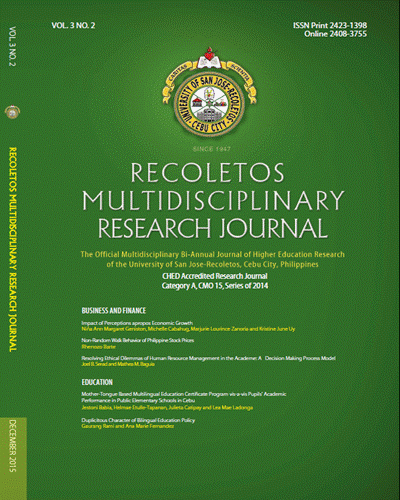Impact of Perceptions apropos Economic Growth
DOI:
https://doi.org/10.32871/rmrj1503.02.01Keywords:
Asian Economy, perception, economic growthAbstract
The Asian economy has been continuously growing since the beginning of the 21st century. Asian countries are starting to carve their names in the A-list of the growing world economy. Considering the stability of its excellent performance in a continual growth, the researchers endeavored to find out whether what a country’s economic growth is reflected in the level of satisfaction of its citizens.Using exploratory data analysis, indices pertinent relating to general perception, social trust, security, government performance, and professional relations were calculated. Results showed that countries which are generally perceived to be not doing well in terms of economy seem to exhibit a higher level of satisfaction from its citizens.
References
Asiegbu, B. C., Akujuobi, & Chidiebere, A. B. (2010). Performance indicators of capital market and the economic growth of Nigeria. Interdisciplinary Journal of Contemporary Research in Business, 2(2), 399-417.Retrieved from http://search.proquest.com.docview/749408717?accountid=33262
Barro, R. J. (1998, June-December). Economic growth and the Asian financial crisis. Malaysian
Journal of Economic Studies, 35(1), 29-43. Retrieved from http://search.proquest.com/docview/201595561?accountid=33262
Drechsler, W. (2009). Towards the law & economics of development: Ragnar nurkse (1907-1959). European Journal of Law and Economics, 28(1), 19-37.doi:http://dx.doi.org/10.1007/s10657-009-9097-7
Group, T. W. B. (2015). GDP ranking. Retrieved from http://data.worldbank.org/datacatalog/GDP-ranking-table
Hussin, F., &Saidin, N. (2012, September). Economic growth in ASEAN-4 countries: A panel data analysis. International Journal of Economics and Finance, 4(9), 119-129. Retrieved fromhttp://search.proquest.com/docview/1038451715?accountid=33262
Hussin, F., &Saidin, N. (2012, September). Economic growth in ASEAN-4 countries: A panel data analysis. International Journal of Economics and Finance, 4(9), 119-129. Retrieved
fromhttp://ccsenet.org/journal/index.php/ijef/article/view/19342/13299
Lewis, W. A. (2007). Theory of economic growth. Oxford, UK: Routledge.
Mo, P. H. (2001, March).Corruption and economic growth.Journal of Comparative Economics, 29(1), 66-79.
Rizzello, S. (2000).Economic change, subjective perception and institutional evolution. Metroeconomica, 51(2), 127-150.
Robbins, S. P., & Judge, T. A. (2007). Organizational behavior. Upper Saddle River, NJ: Prentice Hall.
Tiwari, H. (2014, October 4). Data mining, warehousing and OLAP technology.Discovery, 24(83), 58-62.Retrieved from http://www.discoveryjournals.com/discovery/current_issue/v24/n83/A2.pdf
Transparency International.(2014). How corrupt is your country?.Retrieved from http://www.transparency.org/cpi2014/results
United Nations Development Programme (2014). Sustaining human progress: Reducing vulnerabilities and building resilience. Retrieved from http://hdr.undp.org/en/content/human-development-report-2014
Downloads
Published
How to Cite
Issue
Section
License
Copyright of the Journal belongs to the University of San Jose-Recoletos


